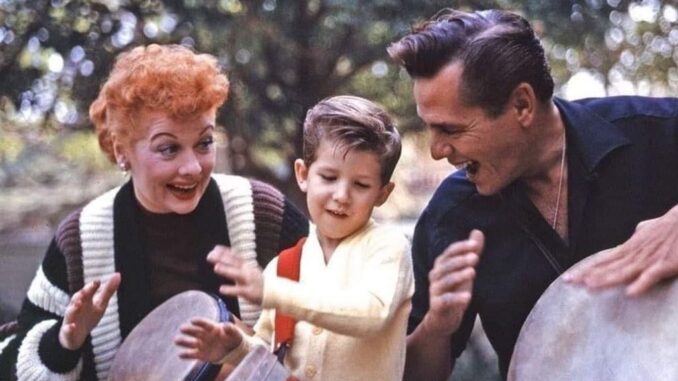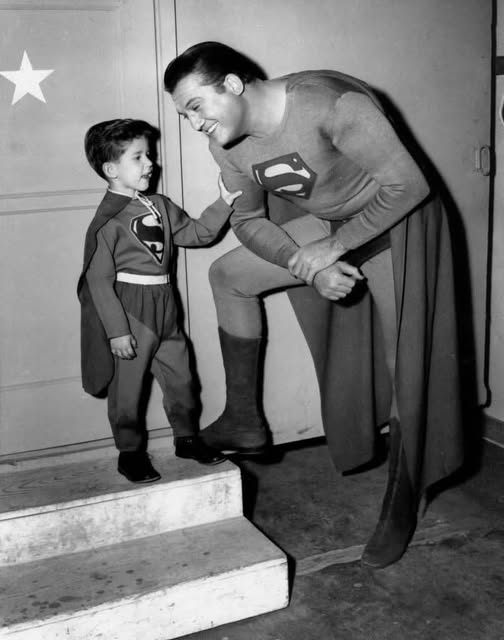
When I Love Lucy first aired its now-iconic episode “Lucy and Superman” in 1957, fans were treated to one of the most charming crossovers in television history. The episode, which featured real-life Superman actor George Reeves and child actor Keith Thibodeau as Little Ricky, became an instant classic — a perfect blend of family warmth, slapstick comedy, and star power. But behind the laughter and the cape, the making of this beloved episode had its share of fascinating stories, creative challenges, and heartfelt moments that made it unforgettable both on and off screen.
A Super Idea Takes Flight
The concept for “Lucy and Superman” was born out of Lucille Ball’s and Desi Arnaz’s desire to do something special for the final season of I Love Lucy. At the time, George Reeves was one of television’s biggest stars, thanks to his role in The Adventures of Superman. Bringing him onto the show as a guest star was a clever move that bridged two pop culture worlds — the superhero craze and America’s favorite sitcom family.
In the episode, Lucy tries to impress Little Ricky (played by Keith Thibodeau) by promising that Superman will attend his birthday party. When her plans fall apart, she decides to don a Superman costume herself, climbing out onto a ledge to surprise her son. Naturally, chaos ensues — and George Reeves, playing himself, swoops in to save the day.
Keith Thibodeau’s Memories: A Young Actor’s Dream
Keith Thibodeau, who joined the I Love Lucy cast at just five years old, later recalled that working with George Reeves was one of the highlights of his childhood career. “I was a huge Superman fan,” Thibodeau once said in interviews. “So when I found out he was coming to the show, I could hardly believe it.”
He remembered that Reeves treated him with great kindness on set, often taking time between takes to talk to him about school, acting, and even baseball. “George was a big guy, but he had this calm presence that made you feel safe,” Thibodeau said. “When you’re that young and Superman walks into the room, it’s magical.”
Thibodeau also shared that filming the birthday party scene was pure fun. “There were balloons, cake, and kids everywhere. It really felt like a real birthday party. The only difference was, you had Superman standing in the middle of it!”
George Reeves’ Legendary Appearance
For George Reeves, guest-starring on I Love Lucy was a unique experience — one of the few times he appeared as Superman outside his own series. By 1957, he had become synonymous with the role, and audiences adored him. But he was also cautious about protecting Superman’s image.
Producers and Reeves worked closely to make sure his appearance respected both his character’s integrity and I Love Lucy’s comedic tone. Reeves reportedly insisted on performing all his lines with sincerity, even when surrounded by Lucy’s trademark chaos. That earnestness made the contrast between Lucy’s antics and Superman’s seriousness even funnier.
In one of the episode’s most famous moments, Reeves arrives at the Ricardo apartment just in time to rescue Lucy, who’s stranded on the ledge in her makeshift Superman costume. His calm line — “And they call me Superman!” — perfectly encapsulates the blend of heroism and humor that defined both the character and the show.
Behind the scenes, Reeves was said to have a great rapport with Lucille Ball. Crew members recalled how Ball admired his professionalism and dedication to his role. “He came in ready, knew his lines, and hit every mark,” one crew member remembered. “He was a true gentleman — and funny, too.”
Lucille Ball’s Fearless Comedy
Lucille Ball was never afraid to take physical risks for the sake of comedy, and this episode was no exception. The scene where Lucy climbs out onto the ledge in a Superman costume was a daring one for the 1950s. Though safety precautions were in place, Ball still performed much of the stunt herself.
Keith Thibodeau later recalled that even as a child, he could sense Ball’s intensity during filming. “She was always in control, but when she got into character, she was unstoppable,” he said. “She made everyone laugh — even Superman.”
The comedic payoff came not only from Lucy’s predicament but also from the mix of slapstick and sincerity. As she’s rescued by the real Superman, Little Ricky’s awe-struck reaction and Lucy’s embarrassed smile delivered one of the most heartwarming endings in I Love Lucy history.

A Production Filled With Heart
Behind the scenes, the energy on set during the “Lucy and Superman” shoot was electric. The episode brought together television royalty, and the cast and crew knew they were creating something special. Desi Arnaz, who directed the episode, worked closely with Reeves to ensure that the crossover felt natural and respectful.
The chemistry among the actors was evident both on and off screen. William Frawley (Fred Mertz) and Vivian Vance (Ethel Mertz) added their usual comic timing, balancing the superhero spectacle with familiar domestic humor. Everyone involved seemed to sense that this was a once-in-a-lifetime television moment.
A Timeless Classic
When “Lucy and Superman” aired on January 14, 1957, it was an instant hit. The episode captured the imagination of children and adults alike — children thrilled to see their hero Superman, and adults delighted by Lucy’s antics. Ratings soared, and critics praised the crossover as “brilliantly funny” and “ingeniously charming.”
Decades later, it remains one of I Love Lucy’s most beloved episodes. For fans of both shows, it represents the perfect meeting of two television icons — Superman’s steadfast heroism and Lucy’s joyful chaos.
Keith Thibodeau has often said that the episode still holds a special place in his heart. “It was magical then, and it still is now,” he reflected. “There was something pure about that moment — a kid, his mom, and his hero all in one room. You can’t forget that.”
A Legacy That Endures
More than 60 years later, “Lucy and Superman” continues to be a testament to the creative power and cultural impact of I Love Lucy. It showcased how television could bring fantasy and everyday life together in a way that was both entertaining and heartfelt.
For George Reeves, it was one of his last on-screen appearances before his untimely death in 1959, making the episode even more poignant for fans. For Keith Thibodeau, it was a highlight of his career as a child actor and a lasting memory of two television legends at their very best.
The laughter, the heart, and the pure magic of that rooftop rescue remain timeless — a perfect example of why I Love Lucy continues to soar higher than ever, even without a cape.